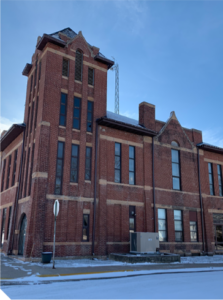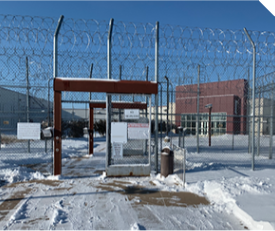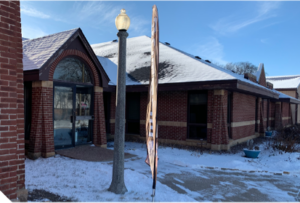Progress Slow, but Present in Appleton
By Heather Rule

Ron Ronning grew up in Las Vegas, but he spent summer vacations in Appleton visiting his grandparents and many relatives.
“Coming back to Appleton on vacation in the summer was like going to Disneyland for me. My grandparents owned a café in town. It was fabulous,” said Ronning, who’s now retired and has lived in Appleton for years.
Those family connections and everybody knowing everyone else in town drew — and kept — Ronning and his wife in Appleton, the small town in western Minnesota.
“There was always that friendly atmosphere in Appleton,” Ronning said.
The atmosphere remained, despite all of the city’s struggles in recent years, namely since the 1,640-bed Prairie Correctional Facility closed in 2010. That left a void in Appleton’s core that’s been hard to rebound from.
Impact of the correctional facility closure
Ronning, a 22-year retired military veteran, is a former mayor and City Council member of Appleton. He also worked at the correctional facility as a unit manager and maintenance supervisor. He was in one of the last groups of people to be let go from their positions at the facility, which employed more than 350 people.

When the facility closed in 2010, both the tax base and the city’s population dropped off. Appleton’s population was 1,552 in 1990 before the correctional facility opened but jumped to 2,871 by 2000 with the counting of inmates. The population dropped to 1,412 in 2010 after the facility closed and was 1,374 by 2020. The number of households went from 742 in 2000 to 638 by 2020.
“When we did close, we were devastated in this community,” Ronning said. “Every part of the town was affected by the prison.
“We were hurt. Let’s just put it that way, pretty badly, when they closed those doors.”
A lot of people lost their homes because of job losses after the shutdown, according to John Olinger, Appleton’s city administrator since April 2023.
“They just walked away from them,” Olinger said. “We’re still dealing with that. We have homes just sitting vacant that need to be torn down, because they’ve been vacant for 12 years.”
While some people left the area in search of other jobs, some stayed and held out hope that the prison would reopen, according to Gary Hendrickx, an Appleton resident and Swift County commissioner for 27 years.
But as time passed, the hope faded.
“I think there’s always a belief that it would reopen,” Hendrickx said. “Therefore, decisions you make sometimes then with that belief are different than the decisions that you would make if you thought, ‘OK, it’s not going to reopen. We have to adjust accordingly.’”
It’s been 14 years now and the facility remains shuttered. Along with the prison, Appleton also lost the Pioneer Public Television business in 2018 when it moved to Granite Falls.
“It was dramatic here,” Olinger said. “And I don’t think they’ve fully recovered from it.”
While it’s not necessarily uncommon for small, rural cities to have their share of struggles, some cities have more advantages than others. A city that’s a county seat draws in more people and businesses, while lake communities bring in tourism.
Appleton has tried to, as Ronning put it, get its “feet back on the ground,” but it’s been difficult. The city isn’t even able to fix its roads, other than some pothole patching. It simply can’t afford to make the repairs; “assessing taxpayers would be an immense amount,” Ronning said.
Small victories for Appleton

Olinger is interested in getting the city focused on its comprehensive plan and that city’s mission: “Appleton stands out as a successful small city because of our willingness to try a new and innovative path.”
For Olinger, a relative newcomer to Appleton, he sees the community coming together.
“I think once they get together and start uniting in a vision, I believe they’ll be successful,” Olinger said. “Because they really are good people here. They’re smart. They love their town, and they want to see it prosper.”
Though progress and growth have been slow, Appleton can appreciate some small victories. It got a new $6 million water treatment plant a few years ago, which was needed, and it worked on upgrading the wastewater treatment system.
The town’s library also got some improvements through a $1.6 million project. The library moved into a remodeled portion of the old school and opened in late fall 2023. The new space is an expansion of the previous library, which was in City Hall and too small to adequately serve Appleton, according to Olinger.
This past year, Federated Telephone went fiberoptic providing broadband to homes, which “not a lot of communities have,” Hendrickx said.
There is a bright spot when it comes to housing, too. The U.S. Economic Development Administration has a new program that will build small cottages on the lots that the City of Appleton acquired from those who lost their jobs when the correctional facility closed.
Thanks to a lot of fundraising, there’s also a new municipal swimming pool that opened a few years ago, replacing the old pool on the same site, which has been a big plus for the community, Ronning said.
“I think overall when you see change and you see positive change, that helps a community vibe overall as well,” Hendrickx said. “There are some things that are really good, and they’re happening. And now we just have to continue focusing on what more we can do.”
Appleton Area Recreational Park is an asset
One additional piece has been a great benefit to Appleton. What used to be the local swimming hole years ago has turned into an off-highway vehicle (OHV) park. Olinger called the park something “that’s going to be a great asset to the city.”
The OHV park is primarily a county initiative, though Appleton has been supportive. Hendrickx recalls his first year as county commissioner in 1997. That year, there was a lot of snow, which caused the park to flood in the spring. “It was basically an old gravel pit,” Hendrickx said. He and the other commissioners at the time decided not to put a lot of infrastructure into the park.
The Minnesota Department of Natural Resources later approached the county with the idea of converting the area to an OHV park. Federal and state grants help bring the park to fruition and, through other land purchases, the park is up to about 335 acres. A couple of years ago, the Greater Minnesota Regional Parks and Trails Commission helped designate it as a regional park. They’re in the process of working on a Minnesota Department of Employment and Economic Development grant to upgrade some more park facilities, like the parking lot and bathrooms.
Going back to the roots of the park as a swimming hole, they also want to create a swimming area within the park, along with kayaking, canoeing, and other amenities, like a place to wash vehicles before leaving the park, according to Hendrickx.
The City of Appleton allows all-terrain vehicles to go through town to get from one end to the other, with the park on one side of the area. The park has been popular on weekends, but Hendrickx would like to see it expand to have more groups venture in during the week as well.
“So, we can see that economic development more than just a couple days a week,” Hendrickx said. “If we can expand that to three, four, five days a week, all that’s beneficial for the community.” Seeing how many vehicles come into Appleton’s community via the OHV park in the spring, summer, and fall is another source of pride for the area, Hendrickx said. People are coming into the community instead of going to the lake, he added.
“I think overall that has helped us at least maintain to the degree that we maintained,” Hendrickx said. “There is the shock, or whatever you want to say, about losing the prison, but there are some things here that we can build upon.” Even with those positive aspects in town, Ronning doesn’t see the city growing right now, which he added is a problem and sad to see. Still, that’s tempered with his optimism for Appleton.
“But I’m very upbeat about the community,” Ronning said. “I think that we just need a break. We need a nice break that the people can see, and we can bring businesses in. That’s what I’m looking for.”
Heather Rule is a freelance writer.

